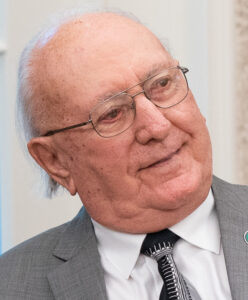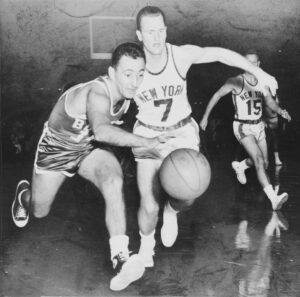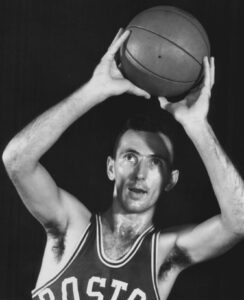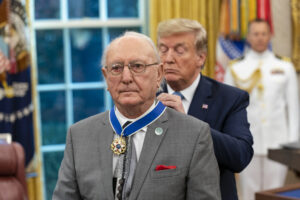By Evan Walsh, Contributing Writer

WORCESTER – Boston Celtics legend Bob Cousy got his start on the path to basketball fame in Worcester more than 75 years ago, and he’s never really left.
In an NBC Sports Boston interview last August meant to celebrate his 95th birthday, Cousy reflected on his life and basketball career.
“I sit back and just think about how fortunate I’ve been in having not only a fruitful life, but a productive, interesting life as well,” he said, sitting in front of bookshelves and cabinets filled with memorabilia and trophies. “I played a child’s game well, [and] I earned a good living.”
The 95-year-old, six-time NBA champion has had an interesting life indeed. Cousy has been recognized as one of basketball’s greatest players, won countless honors, and was awarded the Presidential Medal of Freedom in 2019. Throughout it all, Cousy has made Central Massachusetts proud.
Winning in Worcester

Cousy grew up on Manhattan’s East Side, and after playing stickball, boxball, and “stealing hubcaps,” turned to basketball. Not yet the all-world player he would eventually become, he was twice cut from his high school’s junior-varsity team. However, Cousy would soon find his way on the varsity squad, becoming the “most talked-about kid in town” and winning the city scoring championship in his senior year.
Cousy’s high-school heroics led the College of the Holy Cross to offer him a scholarship; he was headed to Worcester.
Cousy helped the Crusaders win the 1947 NCAA championship in his freshman year. The next three years would be nothing short of dominant: Cousy earned All-East Honors, All-America Honors, and led the team to 29 consecutive victories, setting the school record. Cousy’s number-17 jersey was retired by the College of the Holy Cross in 2008.
Although Cousy would soon graduate to the National Basketball Association (NBA), Worcester remained his home. Cousy married his wife and had one of his daughters in Wormtown. In 2008, Holy Cross unveiled a seven-foot Cousy statue in front of the Luth Athletic Complex. In 2021, another Cousy statue—this time at the DCU Center, performing his signature behind-the-back pass—was erected in Worcester.
“Worcester is my place,” Cousy said at the time of the 2021 statue unveiling. “I love this city. Whatever I have given to it, it has given me much more.”
Success on the Celtics

Cousy joined the Celtics for the 1950-51 season, signing for $9,000. According to the NBA’s profile on Cousy, he “dribbled, shot, passed, scampered and otherwise ran rampant as the Celtics ended the season with their first winning record” since joining the NBA (39-30). The six-foot-one-inch, 175-point guard’s “rambunctious” play “single-handedly drew fans” to watch the Celtics.
In his sophomore season, Cousy averaged 21.7 points-per-game. Cousy spread the wealth; in his third season, he averaged 7.7 assists-per-game, and would eventually earn eight consecutive assists titles. The Celtics would surround Cousy with stars, including Bill Russell, that would propel the team into the NBA Championships. The team would win its first-ever title in 1957—Cousy’s age-28 season—and go on an unmatched stretch of dominance, winning the eight consecutive championships (1959-1966).
Cousy retired as a six-time champion in 1963, and is remembered as an integral part of the NBA’s first dynasty. Cousy finished his Celtics career with nearly 17,000 points, accumulated 13 All-Star nods, 12 All-NBA awards, and became league MVP for his dominant 1956-1957 season.
“I would like to thank you wonderful, wonderful fans of New England that have given the Celtics and myself such continued sincere support,” he said. “I only hope that my playing has in a small way served to repay you in your many kindnesses,” Cousy said at his last regular season game in 1963.
Cousy’s style of play was unique, attention-grabbing, and caught the attention of many sportswriters. He was nicknamed the “Houdini of the Hardwood.”
“Bob Cousy was best known for his razzle-dazzle, ball-handling abilities. With exceptional peripheral vision, large hands, sloping shoulders, and extremely sturdy legs, Cousy was an outstanding all-around player and is considered by many to be one of the best playmakers ever… Cousy’s style and reputation… helped keep the NBA alive during its infancy,” the Naismith Memorial Basketball Hall of Fame wrote about Cousy.
Cousy was inducted into the Hall of Fame in 1971. His number-14 jersey was also retired by the Celtics.
Success off the court
Cousy made an impact outside of the Celtics. For instance, in 1954—while “NBA players did not receive the wide-ranging privileges and protections that exist today” (including no pension, per diem, health benefits, or minimum wage)—Cousy and several other hall-of-fame athletes created the National Basketball Players Association to help advocate and bargain for the athletes.
At Holy Cross, Cousy wrote his senior thesis on the persecution faced by minorities. In his NBA career, Cousy left the state of North Carolina with teammate Chuck Cooper— the first African American to be drafted in the NBA—after learning Cooper could not stay in the same hotel while the Celtics played in the segregated southern states.

Cousy’s demonstrated voice against prejudice and racism—as well as his illustrious basketball career—led President Donald Trump to award the Presidential Medal of Freedom, the nation’s top civilian honor, to Cousy in 2019.
“Bob, you’re one of the all-time greats in the history of sports—not just basketball—and an inspiration to us all,” Trump said at the 2019 ceremony. “Today, America honors and celebrates everything that you have achieved. You’ve achieved so much, even beyond basketball.”
“Only in America could my story have been told,” Cousy said while accepting the medal, also thanking his family, friends, and supporters in the audience. “I’m here to say that I’m easily the most fortunate, lucky, S.O.B. on the planet.”
“This acknowledgement has allowed me to complete my life’s circle: I can stop chasing a bouncing ball,” he said.
RELATED CONTENT:
Iconic Converse Chuck Taylor All Stars sneaker got its start in Malden (fiftyplusadvocate.com)
Basketball’s inventor Naismith valued accessibility above all else (fiftyplusadvocate.com)
Sports fan thrives in his dream job (fiftyplusadvocate.com)












